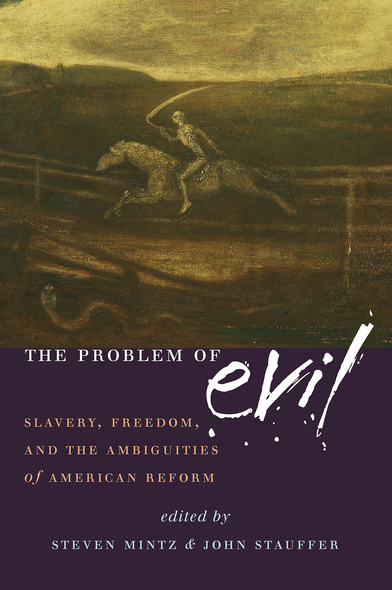The Problem of Evil
Slavery, Freedom and the Ambiguities of American Reform
Edited by Steven Mintz and John Stauffer
University of Massachusetts Press
A collective effort to present a new kind of moral history, this volume seeks to show how the study of the past can illuminate profound ethical and philosophical issues. More specifically, the contributors address a variety of questions raised by the history of American slavery. How did freedom—personal, civic, and political—become one of the most cherished values in the Western world? How has the language of slavery been applied to other instances of exploitation and depersonalization? To what extent is America's high homicide rate a legacy of slavery? Did the abolitionist movement's tendency to view slavery as a product of sin, rather than as a structural and economic problem, accelerate or impede emancipation?
Divided into four parts, with introductions to each section by editors Steven Mintz and John Stauffer, the essays provide succinct guides to the evolution of American slavery, the origins of antislavery thought, the challenges of emancipation, and the post-emancipation legacy of slavery. They also offer fresh perspectives on key individuals, from Benjamin Franklin and Frederick Douglass to Harriet Jacobs and John Brown, and shed new light on the differences between female and male critiques of slavery, the defense of slavery by the South's intellectual elite, and Catholic attitudes toward slavery and abolition.
Above all, The Problem of Evil helps us understand the circumstances that allow social evils to happen, how intelligent and ostensibly moral people can participate in the most horrendous crimes, and how, at certain historical moments, some individuals are able to rise above their circumstances, address evil in fundamental ways, and expand our moral consciousness.
Divided into four parts, with introductions to each section by editors Steven Mintz and John Stauffer, the essays provide succinct guides to the evolution of American slavery, the origins of antislavery thought, the challenges of emancipation, and the post-emancipation legacy of slavery. They also offer fresh perspectives on key individuals, from Benjamin Franklin and Frederick Douglass to Harriet Jacobs and John Brown, and shed new light on the differences between female and male critiques of slavery, the defense of slavery by the South's intellectual elite, and Catholic attitudes toward slavery and abolition.
Above all, The Problem of Evil helps us understand the circumstances that allow social evils to happen, how intelligent and ostensibly moral people can participate in the most horrendous crimes, and how, at certain historical moments, some individuals are able to rise above their circumstances, address evil in fundamental ways, and expand our moral consciousness.
The Problem of Evil is indeed a very important theme that we have too long side-stepped as research scholars. It lingers next to or beneath so much scholarship on slavery, on war, on our heritage of racism and discrimination, on our study of violence generally. This is the dark side of the human condition and that, frankly, is where so much history that re-shapes society takes place. In America we still as a collective society have to remind ourselves of the evil embedded in our nature, our institutions, our past. Thus, the overall theme of this book is really important at this moment in history.'—David W. Blight, author of Race and Reunion:
The Civil War in American Memory
'Slavery's unequivocal evil lies at the heart of debates over apologizing for America's 'peculiar institution' and awarding reparations. In The Problem of Evil: Slavery, Freedom, and the Ambiguities of American Reform, a provocative collection of original essays, the editors Steven Mintz and John Stauffer, along with 23 contributors, admonish scholars to place moral questions in general, but especially American slavery and its legacy, at the center of their work. . . . The contributors to Mintz and Stauffer's excellent collection largely sidestep defining and comparing degrees of evil, but they nevertheless remind us of slavery's timelessness and the ubiquity of moral wrongs. Focusing on evil enables us to see, if not feel, the wicked acts that persons inflict on one another—what Stauffer, a professor of literature and African and African-American studies at Harvard University, eloquently terms 'the dark side of the American soul.''—The Chronicle of Higher Education
'This book offers a wealth of solid knowledge and sharp insight into the conditions for regional war and peace. . . . Invaluable for the purposes of teaching, theorizing, and grasping the turbulent dynamics of global politics.'—International Journal on World Peace
Steven Mintz is the John and Rebecca Moores Professor of History and director of the American cultures program at the University of Houston. John Stauffer is professor of American literature and the history of American civilization at Harvard University.








